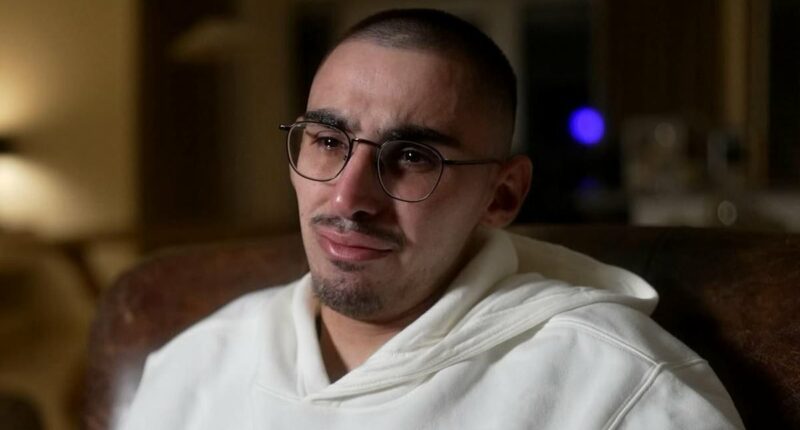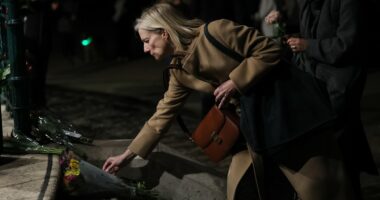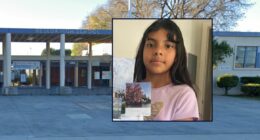Share this @internewscast.com
An Israeli man recently released from captivity in Gaza has bravely opened up about the harrowing abuse he suffered at the hands of his captors. Speaking in an interview with Israel’s Channel 13 program Hazinor, he shared the traumatic details of his ordeal.
Twenty-one-year-old Rom Braslavski was violently kidnapped by Palestinian Islamic Jihad on October 7, 2023, while working as a security guard at the Nova music festival. His abduction marked the beginning of a nightmare that would last for over two years.
Braslavski was held under brutal conditions until his release last month, which was part of a ceasefire agreement brokered by the United States that ensured the freedom of all living hostages.
In the televised interview, Braslavski recounted the horrifying experiences he endured. He described how his captors stripped him of his clothes, bound him, and deprived him of food, subjecting him to extreme suffering.
“They took everything from me — even my underwear,” he revealed. “They tied me up while I was completely naked. I was torn apart, dying, with no food.”
Braslavski shared the desperation he felt, saying, “I prayed to God, ‘Please, save me, get me out of this already.’ And you just say to yourself, ‘What the hell?’”
Mr Braslavski’s testimony marks a harrowing new chapter in the accounts emerging from freed hostages, exposing the scale of the abuse inflicted by Palestinian terrorists.
‘It was sexual violence — and its main purpose was to humiliate me,’ he said. ‘The goal was to crush my dignity. And that’s exactly what he did.’
When asked by Channel 13 reporter Roni Aviram if more assaults took place, Mr Braslavski confirmed they had.

Rom Braslavski, 21, was taken from the Nova music festival on October 7 while working as a security guard

In an upcoming interview with Israel’s Channel 13, he details how he was starved and sexually abused by his captors
‘Yes. It’s hard for me to talk about that part specifically. I don’t like to talk about it. It’s hard, It was the most horrific thing,’ he said.
‘It’s something even the Nazis didn’t do. During Hitler’s time, they wouldn’t have done things like this. You just pray for it to stop. And while I was there — every day, every beating — I’d say to myself, ‘I survived another day in hell. Tomorrow morning, I’ll wake up to another hell. And another. And another. It doesn’t end.’
‘I came back from meeting the devil,’ he added.
While female hostages such as Amit Soussana and Ilana Gritzewsky have bravely spoken of sexual assault in captivity, Mr Braslavski’s testimony is the first by a male survivor to publicly describe such abuse.
Ms Gritzewsky, who testified before the UN Security Council, described being held at Nasser Hospital in Khan Younis.
She said: ‘On the way to Gaza, when they started to touch me and sexually abuse me, I passed out physically and mentally. I couldn’t handle it anymore.’
In May, 15-year-old Dafna Elyakim spoke publicly about the sexual abuse she suffered at the hands of one of her Hamas captors during her time in Gaza.
She had been abducted from her father’s home in Kibbutz Nahal Oz along with her younger sister, Ela, then aged eight.
‘We had one guard, one of the terrorists, who would touch me all the time, or tell me that I was going to stay there — that they would return Ela and everyone else — and only I would stay behind with him. He said we were going to have children together and a house and all that,’ she said. ‘He would always tell me that he was coming with me to shower.’

Mr Braslavski broke down in his first TV interview following his release from captivity in Gaza
Last August, Mr Braslavski family authorised the release of parts of a video distributed by Islamic Jihad, showing him emaciated, tortured, unable to stand and pleading for his life.
His mother, Tami, who campaigned tirelessly across the world for his release, said her son was tempted with food to convert to Islam but refused, holding on to his Jewish identity.
Last month, Mr Braslavski was pictured draped in the Israeli flag as he greeted members of the IDF upon his release.
On festival security duty, he was abducted when trying to save an injured person.
In August this year, a video showed him crying, saying he had run out of food and water, unable to stand.
Mr Braslavski’s full interview will air on Israel’s Channel 13 on Thursday night.
The war began with Hamas’ October 7, 2023, attack, when militants killed 1,200 people and took 251 captives.
Israel’s retaliatory campaign killed nearly 69,000 people, according to Gaza’s Health Ministry, which does not differentiate between combatants and civilians in its count.

Mr Braslavski was freed last month amid a ceasefire deal between Israel and Hamas in Gaza. He is pictured here draped in the Israeli flag as he greeted members of the IDF following his release on October 13

He was working as security at the festival before he was captured. Pictured: Braslavski before he was taken hostage into Gaza
Though most of the 251 who were kidnapped and taken into Gaza have been returned, dead or alive, the last 20 living hostages were only handed back to Israel last month, following the signing of a Gaza peace deal.
Several hostages released by Hamas have revealed they were threatened with weapons and starved to near-death during their time in the tunnels.
Many reported that their cruel Hamas captors ate in front of them as they withered away from hunger.
In one of the worst cases, hostage Avinatan Or, 32, was held in near-total isolation for two years, not meeting another kidnapped person until he was released on Monday.
Avinatan, who was kidnapped alongside his girlfriend Noa Argamani, 28, from the Nova Festival, was also severely starved. Local media reported that he had lost up to 40 per cent of his body weight.
Similarly, hostage Elkana Bohbot, 36, is reported to have spent most of the two years he was held by Hamas chained up in a dark and dingy tunnel where he lost all sense of time.
Kidnapped twins Gali and Ziv Berman, both 28, were separated and cut off from the rest of the world by Hamas.
Though they were held in the same area, neither knew for certain whether the other was alive. Both went through periods of starvation.

















